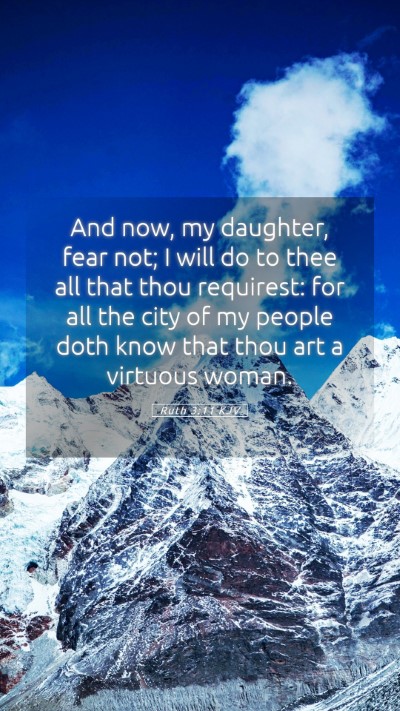Old Testament
Genesis Exodus Leviticus Numbers Deuteronomy Joshua Judges Ruth 1 Samuel 2 Samuel 1 Kings 2 Kings 1 Chronicles 2 Chronicles Ezra Nehemiah Esther Job Psalms Proverbs Ecclesiastes Song of Solomon Isaiah Jeremiah Lamentations Ezekiel Daniel Hosea Joel Amos Obadiah Jonah Micah Nahum Habakkuk Zephaniah Haggai Zechariah MalachiRuth 3:11 Meaning
What is the meaning of Ruth 3:11?
And now, my daughter, fear not; I will do to thee all that thou requirest: for all the city of my people doth know that thou art a virtuous woman.
Ruth 3:11 Bible Verse Meaning
Understanding Ruth 3:11 - A Comprehensive Analysis
Ruth 3:11 presents a pivotal moment in the biblical narrative, rich with meaning and significance. This verse encapsulates themes of loyalty, redemption, and divine providence. Let's delve into the verse and explore the depths of its meanings through insights from esteemed public domain commentaries.
Verse Text
"And now, my daughter, do not fear. I will do for you all that you ask; for all my fellow townsmen know that you are a worthy woman." - Ruth 3:11 (ESV)
Verse Exegesis
The context of Ruth 3:11 is crucial for understanding the important themes present within the passage. Ruth, a Moabite widow, approaches Boaz on the threshing floor, symbolizing her desire for security and redemption. The interaction between them highlights several key concepts in biblical exegesis.
1. Acknowledgment of Worthiness
“I will do for you all that you ask…” signifies the respect and regard Boaz has for Ruth. According to Matthew Henry, Boaz recognizes Ruth’s loyalty to Naomi and her virtuous character, elevating her status as a "worthy woman," akin to the Proverbs 31 depiction of an ideal woman, full of strength and dignity.
2. The Theme of Redemption
The action of Boaz in agreeing to assist Ruth ties into the broader theme of redemption found throughout Scripture. As Albert Barnes elaborates, Boaz serves as a kinsman-redeemer, a significant role in Jewish custom that offers salvation and protection to relatives. This evokes themes echoing Christ's redemptive work and highlights the provision of God’s grace through human agents.
3. Community Recognition
The recognition of Ruth by “all my fellow townsmen” illustrates the communal aspect of character judgment in ancient Israel. Adam Clarke points out that Ruth's reputation among the townsfolk serves as a testament to her integrity and virtue. This observation emphasizes how one's character can reflect God's influence in their life, encouraging believers to strive for a commendable reputation.
Application in Bible Study
Understanding Ruth 3:11 can enrich personal and group Bible study sessions. Here are some insights on how to apply its lessons:
- Reflect on Personal Worth: Consider how God views your character and the importance of integrity.
- Explore the Role of Community: How do the perspectives of friends and community shape our faith journey?
- Embrace Historic Customs: Study the practices of kinsman-redeeming and how they relate to Christ's redemptive work.
Cross References
This verse resonates with several others in Scripture. Here are a few relevant cross-references:
- Proverbs 31:10-31 - The ideal woman
- Leviticus 25:25-28 - The laws regarding a kinsman-redeemer
- Matthew 1:5 - The genealogy of Christ, linking Ruth's story with Jesus’ lineage
Conclusion
The meanings of Bible verses often unfold deeper revelations when examined closely. Ruth 3:11 serves as a reminder of God's providence, encouraging readers to embody virtues of loyalty and integrity. This verse not only reflects Ruth's character but also highlights the redemptive plans of God, which are prevalent throughout the Bible.
As you continue your study, keep in mind the importance of understanding Scripture in its historical and cultural contexts, applying its teachings to your life and exploring its richness through community discussions and Bible study resources.


